By Darcel Rockett
Chicago Tribune
WWR Article Summary (tl;dr) A survey from the Georgetown Law Center on Poverty and Inequality found that compared with young white girls, people think young black girls need less nurturing, protection, support and comfort. They’re seen as more independent, and participants think they know more about mature topics, such as sex.
Chicago Tribune
If you were to write a letter to your childhood self, knowing everything you know now, what would it say?
If you’re black and female, you would likely use the word “adversity” a lot.
A new report from the Georgetown Law Center on Poverty and Inequality reaffirms that being a black girl isn’t easy.
A survey of 325 adults found that compared with young white girls, people think young black girls need less nurturing, protection, support and comfort.
They’re seen as more independent, and participants think they know more about mature topics, such as sex. Dubbed “adultification,” it’s the notion that girls of color, especially those 5-14, are less childlike and, as a result, more likely to be assigned greater culpability for their actions.
The survey is small, but the results are mighty, hard evidence that black girls are seen as less innocent.
I cry foul at the participants’ mindsets.
I’m tired of seeing my brethren either overlooked or looked upon with biased eyes. I’m tired of seeing my sisters categorized within boundaries the rest of the world deems digestable: angry, black woman; hyper-sexualized; loving Mammy. Or to channel singer/songwriter Nina Simone: Peaches, Sweet Thing or Aunt Sarah.
Survey participants were 74% predominantly white, 62% female and 69% held more than a high school diploma.
Surely some of these people are mothers, or present and future caregivers. What mother thinks a child needs less nurturing, support and comfort? If the world believes young black girls don’t need a foundation in which they’re cared for and learn what good care looks like, what chance do they have? How can they be expected to succeed?
“The statistics in that report were mind-blowing. This is how society views us?” said Greta Young, 40. “We have to educate other people to get rid of this stigma. You don’t just come in the world mature and adultlike. Your situation makes you this way. If anything, our young black girls need more nurturing than anybody else.” As a mother of two girls, Lyric, 8, and Michaela, 19, the hair salon owner expressed anger about the toll adultification has taken on black youth.
“I do see a lot of it: younger girls having to grow up so soon. A lot of it has to deal with the household that they’re in, what they’re experiencing in the household, like becoming caretakers at a very young age. Young black girls are treated as nonfactors in society,” she said. “They are totally overlooked.”
Biologically, humans are 99.9% genetically identical, yet African Americans are still seen as “other.” Recent studies on health deserts and residential segregation reveal that systemic racism shortens lives. University of Chicago researchers found that living in an area with heavy exposure to violent crime can lead to elevated blood pressure and obesity. According to the CDC, the risk of pregnancy-related deaths is 3 to 4 times higher for black women.
The new report’s authors say their findings reveal a potential contributing factor to the disproportionate rates of punitive treatment in the education and juvenile justice systems for this population.
“I think that it is nice that the report is trying to put extra special focus on the plight of African American girls, and that they are circulating a call for action,” said Alvin Tillery Jr., director of Northwestern University’s Center for the Study of Diversity and Democracy. “In some ways, it seems like they are trying to match the special emphasis that some think tanks and foundations have put on the plight of African American boys, and that is a good thing.”
Aria Halliday, assistant professor of Women’s Studies at the University of New Hampshire, applauds the new research for connecting the dots between implicit bias and the way black girls are criminalized in public systems.
“We know things have been happening in the news and in the media, but to have Georgetown Law stamp this idea and say, ‘Yes, this is something that we studied and we know it to be true’? Unpacking that is important because the policy becomes ammunition when you walk into a room,” she said.
Black and Latinx boys have been in the educational spotlight as of late, Halliday pointed out, but she believes its time for girls to get some attention. After all, their plights are similar.
Jessica Davenport-Williams, co-founder of Black Girls Break Bread, a Chicago-based organization focused on social/emotional wellness programming for black women and girls, agrees.
“We always see the boys and the gun violence and the killings that we see taking place in Chicago, but there’s this underlying epidemic that is happening for black women and girls,” she said. “We’re either hyper-visible or invisible, there really is no in between.” She and her fellow co-founders hope to change that narrative and show that the mental and physical well-being of black females, no matter what the age, needs to be nurtured.
“We need to have some attention,” she said. “We need to understand the gravity of what’s happening to our young girls.”
To that I say, amen. A strong childhood foundation provides a leg up, and adolescent support and nurturing helps meld society’s future nurturers. Less is never more.














































































































































































































































































































































































